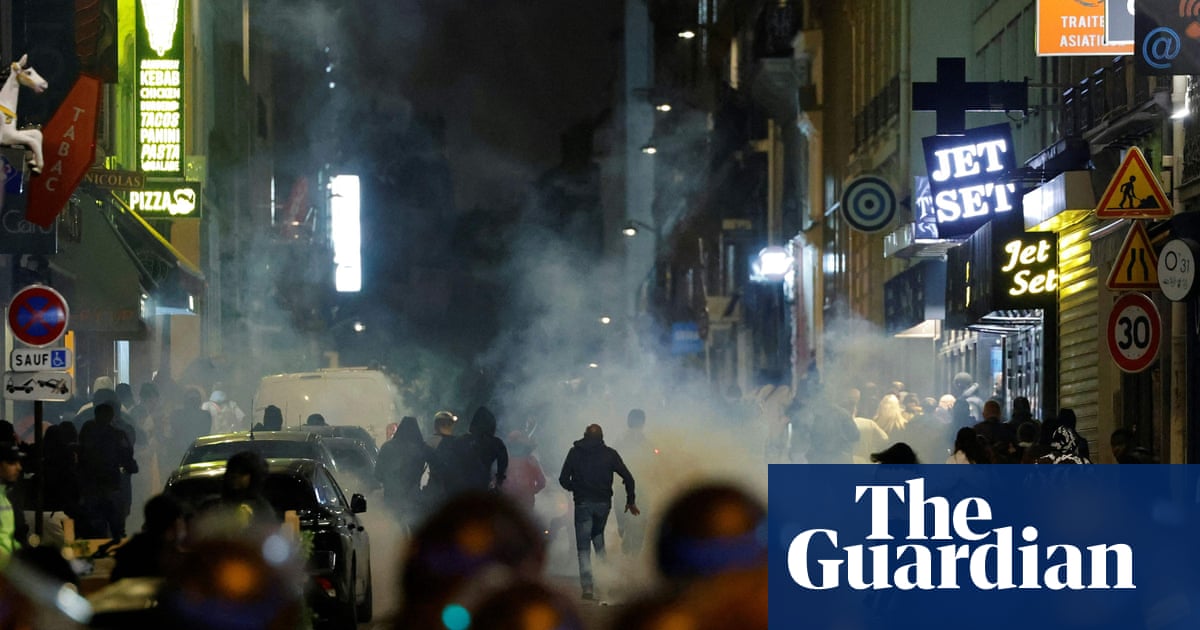
Emmanuel Macron is facing the biggest domestic challenge of his fraught second term in office, after the police shooting of a teenager of Algerian origin at a traffic stop last week led to multiple nights of urban unrest.
The French president on Tuesday announced crisis funding to help the reconstruction of burned-out buildings and public services. But questions remain over deep divisions in French society and the political class.
Teenagers as young as 13 clashed with police across the country as hundreds of public buildings were set alight, more than 5,000 cars were burned, 3,400 people arrested, scores of schools were damaged, 150 post offices attacked, more than 11,000 fires were started and 2,000 shops were looted, with an estimated €1bn damage to businesses. More than 800 police officers were injured and some of the poorest estates in the country woke up to find key buildings – from public libraries to community centres – reduced to ashes.
The president now faces several difficulties. First is a national image problem. Amid deep mistrust of politics, crises have piled up one after the other – from the gilet jaunes anti-government protests of 2018 and 2019 to the millions of protesters who took to the streets this year against Macron raising the pension age to 64. Macron’s diplomatic agenda has been affected: he had to return early from a Brussels summit and postpone a state visit to Germany, only months after he was unable to welcome Britain’s King Charles amid pensions strikes and protests.
Deep-rooted divisions in French politics now seem more entrenched than ever. Since Macron’s centrist grouping lost its overall majority in parliament in the 2022 legislative elections, the government’s ability to pass legislation has been limited as it struggles to convince allies on the right. The far-right leader Marine Le Pen, whose National Rally is the biggest opposition party, is hoping the urban unrest will win her voters, as her party hammers home the sense of “savagery” and insecurity in towns and cities.
When Macron met on Tuesday with more than 250 mayors who had faced violence in towns and on estates, their pleas for help highlighted the deep political divisions.
Mayors on the right said more “authority”, policing and firm-hand was required. Some joined Macron in his calls for parents to better control their teenagers. But those on the left said there had been a failure to address segregation and “ghettoisation” of poor estates, where there was discrimination, inequality in education and a housing policy that concentrated poverty in “sink estates”. They said the last few years of urban renewal programmes – when millions were spent on demolition and rebuilding of certain tower blocks on estates – had failed to address deeper social issues.
A government official said Macron now wanted to “listen intently” to politicians on the ground and try to understand the many complex reasons for unrest before coming up with suggestions.
His immediate priority in the coming days is restoring what the government source called “lasting order” – more than 45,000 police officers a night have continued to patrol estates, which have not completely calmed. Macron deliberately did not declare a state of emergency like that of 2005 when the deaths of two young boys hiding from police in an electricity substation in Clichy-sous-Bois outside Paris triggered weeks of unrest on estates.
The question is what policy solutions Macron could offer for French housing estates. When he first took office in 2017 – and even before that, when he was economy minister – he had focused on entrepreneurship for the deprived outskirts of cities, saying he would liberalise the economy and end the persistent inequality that he said “imprisoned” people by their social origins. But residents on estates say segregation and discrimination have got worse in recent years.
after newsletter promotion
Last month Macron travelled to Marseille, which he intended to use a laboratory for improving life and schooling on tough estates – he will now have to think more broadly. He has slashed class-sizes in primary schools in deprived areas, but mayors have said France’s education system remains one of the most unequal in the world. Philippe Rio, the Communist mayor of Grigny outside Paris, which is known for its high-rise estates and high poverty rates, said this week that half of local children left school with no qualifications.
Meanwhile, rights groups want the executive to take heed of the UN human rights office spokesperson, Ravina Shamdasani, who said of the police shooting: “This is a moment for the country to seriously address the deep issues of racism and discrimination in law enforcement.” But the government has insisted it is a case of one officer who did not respect rules, and there is no systemic or institutional problem in the force.
Policy announcements on the segregation of housing estates will be tricky for Macron. The sociologist Olivier Galland said: “The problems run so deep, they need a structural response that won’t show effects until the long term. In the short term, the only hope is for a return to calm.”
"lasting" - Google News
July 05, 2023 at 11:00AM
https://ift.tt/TOF0lYU
Emmanuel Macron’s uphill battle to achieve ‘lasting order’ in deeply divided France - The Guardian
"lasting" - Google News
https://ift.tt/qmw8Qxy
Shoes Man Tutorial
Pos News Update
Meme Update
Korean Entertainment News
Japan News Update
Bagikan Berita Ini














0 Response to "Emmanuel Macrons uphill battle to achieve lasting order in deeply divided France - The Guardian"
Post a Comment